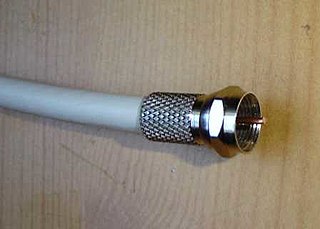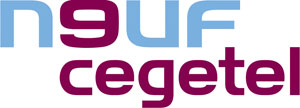
Cable television is a system of delivering television programming to consumers via radio frequency (RF) signals transmitted through coaxial cables, or in more recent systems, light pulses through fibre-optic cables. This contrasts with broadcast television, in which the television signal is transmitted over-the-air by radio waves and received by a television antenna ; or satellite television, in which the television signal is transmitted over-the-air by radio waves from a communications satellite and received by a satellite dish on the roof. FM radio programming, high-speed Internet, telephone services, and similar non-television services may also be provided through these cables. Analog television was standard in the 20th century, but since the 2000s, cable systems have been upgraded to digital cable operation.
Telecommunications in the Dominican Republic include radio, television, fixed and mobile telephones, and the Internet.
Video on demand (VOD) is a media distribution system that allows users to access videos, television shows and films digitally on request. These multimedia are accessed without a traditional video playback device and a typical static broadcasting schedule, which was popular under traditional broadcast programming, instead involving newer modes of content consumption that have risen as Internet and IPTV technologies have become prominent, and culminated in the arrival of VOD and over-the-top (OTT) media services on televisions and personal computers.

A wireless Internet service provider (WISP) is an Internet service provider with a network based on wireless networking. Technology may include commonplace Wi-Fi wireless mesh networking, or proprietary equipment designed to operate over open 900 MHz, 2.4 GHz, 4.9, 5, 24, and 60 GHz bands or licensed frequencies in the UHF band, LMDS, and other bands from 6 GHz to 80 GHz.

Internet Protocol television (IPTV), also called TV over broadband, is the service delivery of television over Internet Protocol (IP) networks. Usually sold and run by a telecom provider, it consists of broadcast live television that is streamed over the Internet (multicast) — in contrast to delivery through traditional terrestrial, satellite, and cable transmission formats — as well as video on demand services for watching or replaying content (unicast).

GCI Communication Corp. (GCI) is a telecommunications corporation operating in Alaska. Through its own facilities and agreements with other providers, GCI provides cable television service, Internet access, wireline (networking), and cellular telephone service. It is a subsidiary of Colorado-based company Liberty Broadband, a company affiliated with Liberty Media that also owns a 26% interest in Charter Communications, having been originally acquired by Liberty in 2015.
A naked DSL, also known as standalone or dry loop DSL, is a digital subscriber line (DSL) without a PSTN service — or the associated dial tone. In other words, only a standalone DSL Internet service is provided on the local loop.

Telecommunications Services of Trinidad and Tobago Limited is a large telephone and Internet service provider in Trinidad and Tobago. The company, which is jointly owned by the Government of Trinidad and Tobago and Cable & Wireless Communications, was formed out of a merger of Telco and Textel. TSTT no longer holds a monopoly in fixed-line telephone services due to FLOW introducing a fixed-line service of their own, and their cellular monopoly was broken in June 2005 when licenses were granted to Digicel and Laqtel.

In the field of telecommunications, the concept of triple play service refers to the provision of three essential services — high-speed broadband Internet access, television, and latency-sensitive telephone services — all delivered over a single broadband connection. This approach emphasizes the convergence of multiple services by a single supplier, aiming to enhance user convenience and streamline service delivery.

Fiber to the x or fiber in the loop is a generic term for any broadband network architecture using optical fiber to provide all or part of the local loop used for last mile telecommunications. As fiber optic cables are able to carry much more data than copper cables, especially over long distances, copper telephone networks built in the 20th century are being replaced by fiber.

Frontier Communications Parent, Inc. is an American telecommunications company. Known as Citizens Utilities Company until 2000, Citizens Communications Company until 2008, and Frontier Communications Corporation until 2020, as a communications provider with a fiber-optic network and cloud-based services, Frontier offers broadband internet, digital television, and computer technical support to residential and business customers in 25 states. In some areas it also offers home phone services.
ESPN3 is an online streaming service owned by ESPN Inc., a joint venture between The Walt Disney Company and Hearst Communications, that provides live streams and replays of global sports events to sports fans in the United States.

Neuf Cegetel was a French wireline telecommunications service provider and a mobile virtual network operator (MVNO). It offered various telecommunications services to consumers, enterprises and wholesale customers, ranking second in the country in annual revenues. It was legally established in 2005 following the completion of the merger between Neuf Telecom and Cegetel. As of June 2008, the company became a wholly owned subsidiary of SFR, and the brand disappeared commercially.
Broadband Internet in Israel has been available since the late 1990s in theory, but it only became practically accessible to most customers in 2001. By 2008, Israel had become one of the few countries with developed broadband capabilities across two types of infrastructure—cable and DSL—reaching over 95% of the population. Actual broadband market penetration stands at 77%, ranked 7th in the world. In 2010, Israel was ranked 26th in The Economist's Digital Economy Rankings. In 2022, Israel was ranked first for digital quality of life by Surfshark.

bmobile is a Mobile Phone, Home Security provider, and fixed wireless provider of Trinidad and Tobago, operating as a division of TSTT.

UPC was the largest cable operator in Switzerland with around 1.1 million residential and business customers and was formed in 1994 through the merger of several cable operators. UPC has been a subsidiary of Liberty Global from 2005 until its discontinuation in 2022.
The distribution of cable television around the world:

Columbus Communications was a cable television, telephone, and broadband speed Internet service provider. Operating as a regional media company, Columbus is currently financially based in Barbados and provides services in Grenada, Jamaica, Trinidad and Tobago, Curaçao, Antigua and Barbuda, Saint Lucia, and Saint Vincent and the Grenadines.
Flow is a trade name of the Caribbean former telecommunications provider Cable & Wireless Communications used to market cable television, internet, telephone, and wireless services. Flow also replaced the UTS brand in the Dutch and French Caribbean, following their acquisition of United Telecommunications Service (UTS).

AT&T Internet is an AT&T brand of broadband internet service. Previously, AT&T Internet was branded as U-verse Internet and bundled with U-verse TV, which was spun off into the newly independent DirecTV in 2021. AT&T Internet plans powered by fiber-optic cable use the AT&T Fiber brand.












